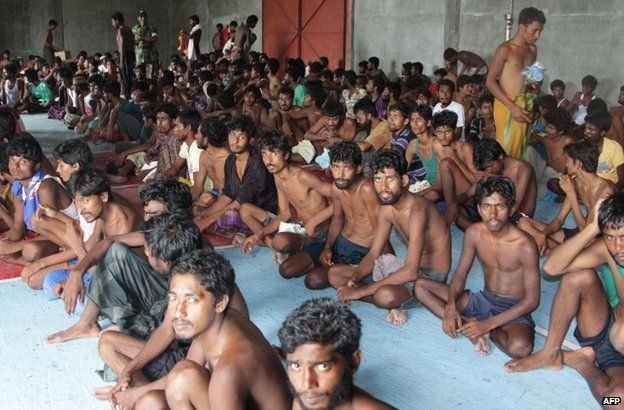Migrants rescued from sinking boat off Indonesia's Aceh
- Published

More than 700 migrants from Bangladesh and Myanmar have been rescued from a sinking boat off Indonesia's coast.
Reports say another boat was turned back by the Indonesian navy.
The fate of another vessel of stranded migrants off the coast of Thailand is unclear after it was towed out of Thai waters.
Human Rights Watch has warned of deadly "human ping-pong" in the Andaman sea, where thousands more are believed to be adrift, struggling to land.
Rohingya Muslims have been leaving Buddhist-majority Myanmar, also known as Burma, because they are not recognised as citizens of the country and face persecution. Many of the Bangladeshis at sea are thought to be economic migrants.
Critically ill
They attempt to flee every year during the non-monsoon season, but the smugglers who take them to Thailand have been scared by a recent Thai crackdown and instead they are reported to have been abandoned at sea.
"For more than two months we were in the boat, we were only given little food and we were beaten when we asked for more," said Mohamad Ali, a Bangladeshi migrant.
He told the BBC that he had paid 12,000 Malaysian ringgit ($3,366; £2,133) to the boat's captain for his passage.
An Indonesian police chief in Aceh told AFP news agency that he believed the rescued boat had already been pushed out of Malaysian waters by Malaysia's navy. He said it was sinking and towed to shore by fishermen. Medical officials said eight of the migrants were critically ill.
The BBC's Jonathan Head found the boat off Thailand (Thursday 14 May): "This is just the most extraordinary scene"
The official policy of Thailand, Malaysia and Indonesia is to push back migrants trying to arrive, a policy the UN said on Friday it was "appalled" by.
"The focus should be on saving lives, not further endangering them," said UN High Commissioner for Human Rights spokesman Zeid Ra'ad Al Hussein.
He added that the decision by the Thai navy to send a boat carrying more than 300 Rohingya Muslims near the southern Thai island of Koh Lipe on Thursday out of its waters on Thursday night was "incomprehensible and inhumane".
Thai officials said the migrants did not want to go to shore but wanted to continue their journey to Malaysia.
Migrants dived into the water as aid was dropped to them
The BBC's Jonathan Head, who visited the boat on Thursday, says its passengers had contacted their families to say that armed men in uniform had boarded the ship, repaired its broken engine, given them food and sent the boat south. Helicopters were also shown dropping food into waters nearby and migrants swimming out to eat it.
Jonah Fisher reports on the conditions in the Ohn Taw Gyi camp in Rakhine State
But our correspondent says that after nearly three months at sea, some are likely to need medical attention. Those on board told the BBC that 10 people had died.
It is unclear how many boats full of people are adrift at sea, but rights group say thousands of migrants are probably stranded.
Thailand has announced a regional crisis meeting for 29 May. But Myanmar has reportedly indicated that it will probably not attend.
Who are the Rohingyas?
- Rohingyas are a distinct, Muslim ethnic group mainly living in Myanmar, which is also known as Burma
- Thought to be descended from Muslim traders who settled there more than 1,000 years ago
- Also live in Bangladesh, Saudi Arabia and Pakistan
- In Myanmar, they are regularly persecuted - subjected to forced labour, have no land rights, and are heavily restricted
- In Bangladesh many are also desperately poor, with no documents or job prospects
Are you in in the region? You can share your experience by emailing haveyoursay@bbc.co.uk.
If you would be happy to speak further to a BBC journalist, please include a contact telephone number.
Email your pictures to yourpics@bbc.co.uk, upload them here, tweet them to @BBC_HaveYourSay or text 61124. If you are outside the UK, send them to the international number +44 7624 800 100 or WhatsApp us on +44 7525 900971
Read our terms and conditions.
- Published18 May 2015
- Published14 May 2015
- Published13 May 2015
- Published25 November 2012
- Published23 July 2012